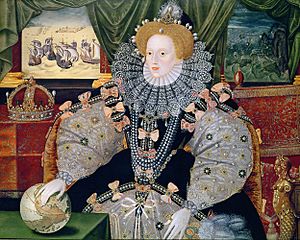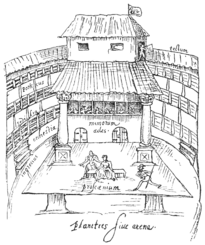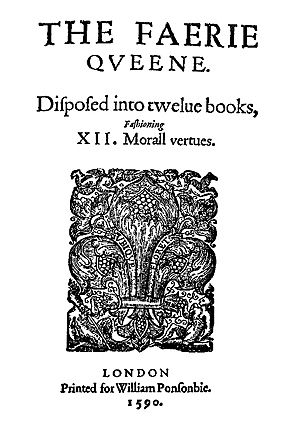Elizabethan literature facts for kids

Elizabethan literature is all the amazing writing created in England when Queen Elizabeth I was in charge (from 1558 to 1603). It was a truly special time for English literature, like a golden age! During this period, people wrote fantastic plays for the theatre, beautiful poems with new styles like the sonnet, and interesting stories and reports in prose. Famous writers from this time include William Shakespeare, Edmund Spenser, and Christopher Marlowe.
Contents
What Was Happening in England?
Queen Elizabeth I's time was full of energy and new ideas. England saw big achievements in art, exciting voyages of discovery, and the creation of the Church of England. England also successfully defended itself from military threats, especially from Spain.
During her rule, London became a hub for culture. Both the royal court and everyday people enjoyed great poetry and plays. English writers mixed ideas from the Medieval theatre with discoveries from the Renaissance. They learned from ancient Roman playwrights like Seneca the Younger (for sad plays called tragedies) and Plautus and Terence (for funny plays called comedies). Italy was a big source of these new ideas for England. A language expert named John Florio, whose father was Italian, helped bring a lot of Italian language and culture to England.
Prose: Stories and Writings
Prose means writing that isn't poetry or plays. Two very important writers of prose during Elizabeth's reign were John Lyly and Thomas Nashe.
John Lyly's Fancy Style
John Lyly (born around 1553 or 1554) was an English writer, poet, and playwright. He is famous for his books Euphues: The Anatomy of Wit (1578) and Euphues and His England (1580). Lyly's special writing style, which was very detailed and flowery, is called euphuism. He had a big influence on William Shakespeare's romantic comedies. For example, Lyly's play Love's Metamorphosis likely inspired Shakespeare's Love's Labour's Lost.
Thomas Nashe and His Pamphlets
Thomas Nashe (born in 1567) is known as the best of the English pamphleteers of his time. Pamphlets were like small booklets or essays. Nashe was also a playwright, poet, and satirist (someone who uses humor to criticize things). His most famous work is the novel The Unfortunate Traveller.
George Puttenham (born around 1529) was another writer and literary critic. He is thought to be the author of an important book about poetry and writing called The Arte of English Poesie (1589).
Poetry: New Ways to Write
Italian literature greatly influenced early English Renaissance poets like Thomas Wyatt (born in 1503). He brought many new ideas to English poetry. Along with Henry Howard, Earl of Surrey, he introduced the sonnet from Italy to England in the early 1500s. Wyatt wanted to make English writing more refined and powerful.
The Sonnet: A New Poem Style
A sonnet is a poem with 14 lines. Wyatt often used ideas from the sonnets of the Italian poet Petrarch. Petrarchan sonnets usually have eight lines (an octave) that rhyme in a specific way, followed by six lines (a sestet) with a different rhyme pattern. There's often a "volta" or turn in meaning between the octave and sestet.
Wyatt used the Petrarchan octave, but he changed the ending. His sonnets often ended with two rhyming lines, called a rhyming couplet. This change helped create what we now call the English sonnet, which Shakespeare later made very popular.
Famous Elizabethan Poets
Later in the 1500s, English poetry became more complex, often using many references to old Greek and Roman myths. The most important poets of this time were Edmund Spenser and Sir Philip Sidney. Even Queen Elizabeth I herself wrote poems sometimes, like "On Monsieur's Departure".
Edmund Spenser (born around 1552) wrote The Faerie Queene (published in 1590 and 1596). This was a long, epic poem that used a fantastical allegory (a story with a hidden meaning) to celebrate the royal family and Queen Elizabeth I.
Sir Philip Sidney (born in 1554) was a poet, courtier (someone who attended the royal court), and soldier. He is remembered as one of the most important figures of the Elizabethan era. His works include Astrophel and Stella and An Apology for Poetry.
Poems meant to be sung as songs, like those by Thomas Campion (born in 1567), also became popular as printed books became more common in homes.
Theatre: The Stage Comes Alive

During the Renaissance, people in Italy rediscovered the ancient Greek and Roman theatre. This sparked new interest in plays, moving away from the old religious "mystery" and "miracle" plays of the Middle Ages. Italian writers were inspired by Seneca the Younger for tragedies and by Plautus for comedies.
In England, during the reigns of Queen Elizabeth I (1558–1603) and later King James I (1603–1625), London's culture produced amazing plays. English playwrights were fascinated by the Italian style. Many Italian actors even lived in London. John Florio, an Italian language expert, taught at King James I's court and may have been a friend of William Shakespeare. He helped bring Italian culture to England.
Early Elizabethan Plays
Some of the first Elizabethan plays include Gorboduc (1561) by Sackville and Thomas Norton. Another important early play was Thomas Kyd's (born in 1558) The Spanish Tragedy (1592). This play was very popular and influential. It created a new type of play called a revenge play or revenge tragedy. The story has several violent murders and even features a character who is the spirit of Revenge.
The Spanish Tragedy was often mentioned or made fun of in plays by other Elizabethan writers like William Shakespeare and Christopher Marlowe. Many parts of The Spanish Tragedy, such as a play-within-a-play used to catch a murderer, appear in Shakespeare's famous play Hamlet.
Jane Lumley (born in 1537) was the first person to translate a play by the Greek writer Euripides into English. Her translation of Iphigeneia at Aulis is the first known play written by a woman in English.
William Shakespeare: The Master Playwright
William Shakespeare (born in 1564) is the most famous writer of this period, both as a poet and a playwright. Shakespeare wrote many different kinds of plays:
- Histories: Plays about English kings and historical events.
- Tragedies: Sad plays where the main character often faces a terrible downfall, like Romeo and Juliet, Hamlet, Othello, and Macbeth.
- Comedies: Funny plays that often end happily, like A Midsummer Night's Dream and Twelfth Night.
- Romances: Later plays that mix sad and happy parts, often ending with forgiveness and reconciliation, like The Tempest.
Shakespeare's early comedies, like A Comedy of Errors, were very clever. Later, he wrote more romantic comedies like Much Ado About Nothing. He also added funny prose scenes to his history plays, such as Henry IV, parts 1 and Henry V. His play Julius Caesar, based on ancient Roman history, brought a new kind of drama to the stage.
Shakespeare continued writing into the next period, called the Jacobean period. His later tragedies, like King Lear, are some of his most powerful works. In his final years, he wrote plays that were more like romances, such as The Winter's Tale.
Other Important Playwrights
Other key figures in the Elizabethan theatre include Christopher Marlowe and Thomas Dekker.
Christopher Marlowe (born in 1564) wrote plays that often explored the moral struggles of a Renaissance man. He brought the German story of Faust to England in his play Doctor Faustus (around 1592). This play is about a scientist who sells his soul to the Devil because he wants unlimited knowledge and power. It uses ideas from old "morality plays" to show temptation and downfall.
Thomas Dekker (born around 1570) was involved in writing many plays, often working with others. He is especially remembered for The Shoemaker's Holiday (1599), which he wrote by himself. Dekker is known for showing real daily life in London and for his sympathy for poor people.
Robert Greene (born around 1558) was another popular playwright. He is now best known for a pamphlet published after his death, Greene's Groatsworth of Wit, which is believed to contain a critical comment about William Shakespeare.
Other Writers of the Time
Here are some other important writers born during this period:
- John Donne (1572–1631)
- Ben Jonson (1572–1637)
- Thomas Middleton (1580–1627)
- John Webster (c. 1580–c. 1634)
See also
- English Renaissance theatre
- Jacobean literature
- Pamphlet wars
- Renaissance literature
 | Calvin Brent |
 | Walter T. Bailey |
 | Martha Cassell Thompson |
 | Alberta Jeannette Cassell |


